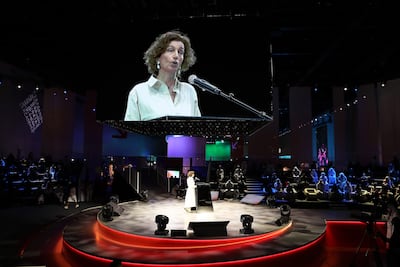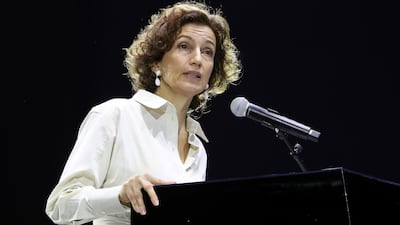It’s time to get serious when discussing culture’s contribution to society and economies, says Unesco director general Audrey Azoulay.
Speaking to The National after delivering a keynote address at the World Conference on Creative Economy event on Tuesday, the United Nations official describes how Covid-19 has accelerated the understanding of culture’s role within the public and private sectors.
“One of the lessons of the pandemic is to truly appreciate the power of culture, and that doesn't only apply for the economy, but also to the importance of heritage,” she says. “We see that, for instance, by not being able to gather in places and experience events, we felt like we are missing something important.
“At Unesco, we have been working very hard to show the impact of creative industries and in that process we have found that it has been severely under-evaluated.”
However, ignorance surrounding the creative and cultural industries is not the sole reason for that estimate, Azoulay believes.
“It is a very fragmented sector and it’s not full of large, big industries and instead is full of those much smaller,” she says.
“So we need to bring all that information together and present a global vision that shows the immense impact of the industry, and that's not only in terms of numbers but that of value such as soft power and inclusiveness.”
Work is already under way, with Unesco and the Department of Culture and Tourism Abu Dhabi launching a landmark report in March on Covid-19’s impact on the cultural and creative industries.
That report will form the centrepiece for future advocacy of government and financial institutions to increase support for the beleaguered industries, which — according to Azoulay's keynote address — lost more than $750 billion and 10 million jobs in 2020.
“It is necessary to have these kinds of figures available when you talk to these kinds of bodies,” she says. “It is about showing how culture is also about job creation and how it is an important way to include the next generation. These are all essential steps.”
The regional effect
With her parents hailing from Morocco and as a frequent visitor to the Arab world, Azoulay says the culture and creative industries can play a galvanising role across Mena.
“We are talking about an area with a huge youth population and unemployment,” she says. “So these industries can play an important role in not only filling those essential gaps but also barriers between generations in terms of mutual understanding.”
Azoulay has seen some of these formed connections first hand in the Iraqi city of Mosul.
A Unesco project co-funded by the UAE government in 2018, called Revive the Spirit of Mosul, aims to rebuild the city's historic landmarks, such as the 12th century Al Nuri Mosque and its leaning minaret, the Al Saa’a Church and the 800-year-old Al Tahera church.
The UAE has invested $50 million (Dh183.6m) in the projects.
“It is one our big success stories because it shows what culture can provide terms of giving people a sense of hope for the future through employment and in understanding the importance of their past,” Azoulay says.
“Mosul is a city renowned for its cultural diversity, a centre of knowledge with its libraries which have been destroyed by terrorism.
“So the initiative has people from different generations and religions working together in a project that unites them all.”
Abu Dhabi joins esteemed Unesco list
Another collaborative initiative that continues to bear fruit is the Unesco Creative Cities Network.
Launched in 2004, the programme promotes co-operation among cities recognised as cultural hubs regionally and internationally.
Abu Dhabi recently joined the esteemed list, which includes more than 50 cities, including Liverpool in England, Ramallah in Palestine, Seville in Spain and Mannheim in Germany.
Azoulay says the UAE capital's cultural institutions and creatives are set to benefit from the comprehensive global array of industry contacts, including musicians, festival organisers and influential cultural figures, to create new collaborations at home and abroad.
“We have also seen the effect of that initiative during Covid-19 with many cities working together to help Beirut, which is also part of the network, after the port explosion,” she says. “Some of that included sharing knowledge when it becomes to best practices for certain initiatives taking place during the pandemic.”
These are all encouraging signs that discussions and initiatives surrounding culture and creativity have evolved well beyond the prism of entertainment and leisure, she says.
From its economic and social benefits to building bridges with communities and cultures, Azoulay says the creative industries will only grow in size and importance.
“In this time of crisis we have seen more than ever the essential role of culture in the cohesion of society and to bring people together,” she says.
“We should seize the long-term opportunities offered by the creative economy because it is a sector which employs more young people than others … [and] essential to the developments of societies.”
The World Conference on Creative Economy runs until Thursday, December 9 at the Dubai Exhibition Centre, Expo 2020 Dubai. For more information, go to wcce.ae
The specs: 2019 Haval H6
Price, base: Dh69,900
Engine: 2.0-litre turbocharged four-cylinder
Transmission: Seven-speed automatic
Power: 197hp @ 5,500rpm
Torque: 315Nm @ 2,000rpm
Fuel economy, combined: 7.0L / 100km
UAE currency: the story behind the money in your pockets
Real estate tokenisation project
Dubai launched the pilot phase of its real estate tokenisation project last month.
The initiative focuses on converting real estate assets into digital tokens recorded on blockchain technology and helps in streamlining the process of buying, selling and investing, the Dubai Land Department said.
Dubai’s real estate tokenisation market is projected to reach Dh60 billion ($16.33 billion) by 2033, representing 7 per cent of the emirate’s total property transactions, according to the DLD.
The specs
Engine: 2.0-litre 4cyl turbo
Power: 261hp at 5,500rpm
Torque: 405Nm at 1,750-3,500rpm
Transmission: 9-speed auto
Fuel consumption: 6.9L/100km
On sale: Now
Price: From Dh117,059
UAE v Zimbabwe A
Results
Match 1 – UAE won by 4 wickets
Match 2 – UAE won by 5 wickets
Match 3 – UAE won by 25 runs
Match 4 – UAE won by 77 runs
Fixture
Match 5, Saturday, 9.30am start, ICC Academy, Dubai
Profile of Udrive
Date started: March 2016
Founder: Hasib Khan
Based: Dubai
Employees: 40
Amount raised (to date): $3.25m – $750,000 seed funding in 2017 and a Seed round of $2.5m last year. Raised $1.3m from Eureeca investors in January 2021 as part of a Series A round with a $5m target.
Volvo ES90 Specs
Engine: Electric single motor (96kW), twin motor (106kW) and twin motor performance (106kW)
Power: 333hp, 449hp, 680hp
Torque: 480Nm, 670Nm, 870Nm
On sale: Later in 2025 or early 2026, depending on region
Price: Exact regional pricing TBA
box
COMPANY PROFILE
Company name: Letstango.com
Started: June 2013
Founder: Alex Tchablakian
Based: Dubai
Industry: e-commerce
Initial investment: Dh10 million
Investors: Self-funded
Total customers: 300,000 unique customers every month
On Instagram: @WithHopeUAE
Although social media can be harmful to our mental health, paradoxically, one of the antidotes comes with the many social-media accounts devoted to normalising mental-health struggles. With Hope UAE is one of them.
The group, which has about 3,600 followers, was started three years ago by five Emirati women to address the stigma surrounding the subject. Via Instagram, the group recently began featuring personal accounts by Emiratis. The posts are written under the hashtag #mymindmatters, along with a black-and-white photo of the subject holding the group’s signature red balloon.
“Depression is ugly,” says one of the users, Amani. “It paints everything around me and everything in me.”
Saaed, meanwhile, faces the daunting task of caring for four family members with psychological disorders. “I’ve had no support and no resources here to help me,” he says. “It has been, and still is, a one-man battle against the demons of fractured minds.”
In addition to With Hope UAE’s frank social-media presence, the group holds talks and workshops in Dubai. “Change takes time,” Reem Al Ali, vice chairman and a founding member of With Hope UAE, told The National earlier this year. “It won’t happen overnight, and it will take persistent and passionate people to bring about this change.”
AI traffic lights to ease congestion at seven points to Sheikh Zayed bin Sultan Street
The seven points are:
Shakhbout bin Sultan Street
Dhafeer Street
Hadbat Al Ghubainah Street (outbound)
Salama bint Butti Street
Al Dhafra Street
Rabdan Street
Umm Yifina Street exit (inbound)
Mohammed bin Zayed Majlis
Mica
Director: Ismael Ferroukhi
Stars: Zakaria Inan, Sabrina Ouazani
3 stars
RESULTS
Catchweight 63.5kg: Shakriyor Juraev (UZB) beat Bahez Khoshnaw (IRQ). Round 3 TKO (body kick)
Lightweight: Nart Abida (JOR) beat Moussa Salih (MAR). Round 1 by rear naked choke
Catchweight 79kg: Laid Zerhouni (ALG) beat Ahmed Saeb (IRQ). Round 1 TKO (punches)
Catchweight 58kg: Omar Al Hussaini (UAE) beat Mohamed Sahabdeen (SLA) Round 1 rear naked choke
Flyweight: Lina Fayyad (JOR) beat Sophia Haddouche (ALG) Round 2 TKO (ground and pound)
Catchweight 80kg: Badreddine Diani (MAR) beat Sofiane Aïssaoui (ALG) Round 2 TKO
Flyweight: Sabriye Sengul (TUR) beat Mona Ftouhi (TUN). Unanimous decision
Middleweight: Kher Khalifa Eshoushan (LIB) beat Essa Basem (JOR). Round 1 rear naked choke
Heavyweight: Mohamed Jumaa (SUD) beat Hassen Rahat (MAR). Round 1 TKO (ground and pound)
Lightweight: Abdullah Mohammad Ali Musalim (UAE beat Omar Emad (EGY). Round 1 triangle choke
Catchweight 62kg: Ali Taleb (IRQ) beat Mohamed El Mesbahi (MAR). Round 2 KO
Catchweight 88kg: Mohamad Osseili (LEB) beat Samir Zaidi (COM). Unanimous decision
Killing of Qassem Suleimani
The more serious side of specialty coffee
While the taste of beans and freshness of roast is paramount to the specialty coffee scene, so is sustainability and workers’ rights.
The bulk of genuine specialty coffee companies aim to improve on these elements in every stage of production via direct relationships with farmers. For instance, Mokha 1450 on Al Wasl Road strives to work predominantly with women-owned and -operated coffee organisations, including female farmers in the Sabree mountains of Yemen.
Because, as the boutique’s owner, Garfield Kerr, points out: “women represent over 90 per cent of the coffee value chain, but are woefully underrepresented in less than 10 per cent of ownership and management throughout the global coffee industry.”
One of the UAE’s largest suppliers of green (meaning not-yet-roasted) beans, Raw Coffee, is a founding member of the Partnership of Gender Equity, which aims to empower female coffee farmers and harvesters.
Also, globally, many companies have found the perfect way to recycle old coffee grounds: they create the perfect fertile soil in which to grow mushrooms.
The specs: 2019 Mercedes-Benz GLE
Price, base / as tested Dh274,000 (estimate)
Engine 3.0-litre inline six-cylinder
Gearbox Nine-speed automatic
Power 245hp @ 4,200rpm
Torque 500Nm @ 1,600rpm
Fuel economy, combined 6.4L / 100km
Key facilities
- Olympic-size swimming pool with a split bulkhead for multi-use configurations, including water polo and 50m/25m training lanes
- Premier League-standard football pitch
- 400m Olympic running track
- NBA-spec basketball court with auditorium
- 600-seat auditorium
- Spaces for historical and cultural exploration
- An elevated football field that doubles as a helipad
- Specialist robotics and science laboratories
- AR and VR-enabled learning centres
- Disruption Lab and Research Centre for developing entrepreneurial skills
Red flags
- Promises of high, fixed or 'guaranteed' returns.
- Unregulated structured products or complex investments often used to bypass traditional safeguards.
- Lack of clear information, vague language, no access to audited financials.
- Overseas companies targeting investors in other jurisdictions - this can make legal recovery difficult.
- Hard-selling tactics - creating urgency, offering 'exclusive' deals.
Courtesy: Carol Glynn, founder of Conscious Finance Coaching
GAC GS8 Specs
Engine: 2.0-litre 4cyl turbo
Power: 248hp at 5,200rpm
Torque: 400Nm at 1,750-4,000rpm
Transmission: 8-speed auto
Fuel consumption: 9.1L/100km
On sale: Now
Price: From Dh149,900
Specs
Engine: 51.5kW electric motor
Range: 400km
Power: 134bhp
Torque: 175Nm
Price: From Dh98,800
Available: Now




